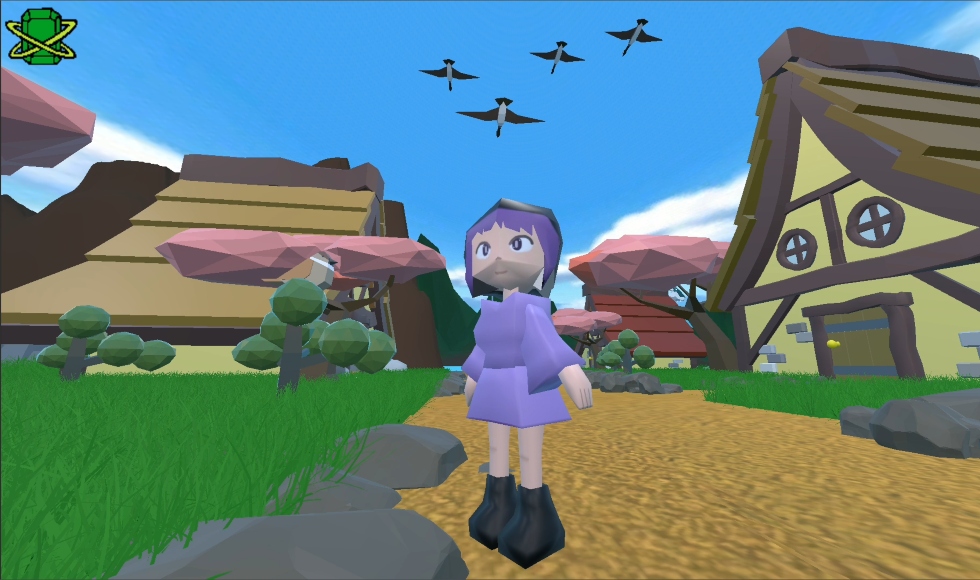Mac game-design students level up at provincial showcase

A screenshot from Halcyon, an ecologically themed time travel game designed by students in the third-year Media Arts game design class.
One day. 155 different video games created by students from 23 colleges and universities. Packed rooms filled with gaming consoles, VR headsets and the din of players, observers, judges and game design teams.
For the 40 or so McMaster students in last term’s video game design class, MEDIAART 3L03, this was the culmination of six weeks of intense work on Halcyon, their ecologically-themed time-travel game that made its debut at the 2025 Level Up Showcase, an annual event held in Toronto to feature the work of postsecondary game-design students.
At the showcase, which is attended by thousands of people each year, student game-design teams – often several from the same school – display their games to the public, competing for best-in-show awards and receiving feedback from players and industry judges alike.
“When students go to the Level Up Showcase, they get the excitement of sharing their game with a much bigger audience,” explains David Ogborn, the media arts professor who teaches the third-year game-design class. “They also get to really see and feel how their efforts are part of the much larger social project of newer game makers making games in Ontario. I’m always beyond grateful to the organizers who produce the event and bring everyone together around student games.”
McMaster’s team was unique in a few ways. For one thing, rather than a team of three or four, the entire 40-person class worked on Halcyon, divided into teams responsible for everything from the user interface and programming to sound, 3D art and deciding the look and feel for each level of the game.
And, unlike the teams that had a full academic year or more to work on their games, the Mac team had about six weeks to pull everything together.
“It was so interesting talking to other people and getting to know the behind-the-scenes process for their games,” says Sandhya Acharya, a fourth-year media arts student who was part of the level design team. “A lot of people were really impressed by what we were able to do in the time that we had.”
The Halcyon team also wasn’t the only McMaster group at Level Up this year. Not Waiting for Godot, an extra-curricular group whose name references both the play by Samuel Beckett and Godot, a popular open-source gaming engine, was also on hand to showcase their improvised gaming practice. In this style of gaming, players use online spreadsheets to design and change levels of games together while playing them in real time.
The group meets weekly during the academic year in Ogborn’s Networked Imagination Laboratory (and welcomes new members!).
For the Halcyon team, wrangling 40 people to produce the game took some serious skills – not just in technical areas, like 3D modeling and working with game-development software like Blender and Godot, but in collaboration and communication as well.
“For me, the most important lesson I learned was collaboration,” says Jiayao Chen, a fourth-year media arts student who was on the sound design team. “We weren’t creating sounds based on our expectations, but on the level design team’s concept of the whole environment – we had to cooperate with the whole group, not just make the sounds we wanted.”
And while group projects are often a dreaded part of classroom work, in the case of game design, teamwork is absolutely essential – and teaches valuable lessons that extend beyond the classroom.
“It was really interesting to learn how big teams work together – how people learn to communicate as a group, together,” says fourth-year media arts student Dylan Callaghan, who was part of the 3D art team. “In media arts, there are a lot of teams like that, where you’re all working on the same thing but can’t be talking to each other all the time. It was really important for us all to develop our communication skills to keep things on track.”
But Ogborn points out that it isn’t just students who learn things in his class and at the showcase.
“Teaching this class and making a game together with all the students in the class is an amazing privilege of my work at McMaster,” he says. “I learn so much from the class every time, and am very proud of the games this and previous classes have made!”

